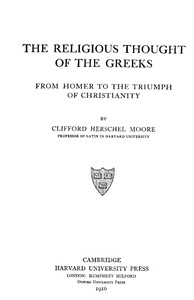The Religious Thought of the Greeks, from Homer to the Triumph of Christianity
"The Religious Thought of the Greeks, from Homer to the Triumph of Christianity" by Clifford Herschel Moore is a historical account written in the early 20th century. The work compiles eight lectures that explore the evolution of Greek religious thought over a span of more than a thousand years. The focus lies on the Greeks' concepts regarding the deities, human obligations toward them, and the philosophical implications of their beliefs, culminating in
the rise of Christianity. At the start of the lectures, Moore sets the groundwork by discussing the significance of the Homeric epics, notably the "Iliad" and "Odyssey," in shaping Greek religious identity. He outlines how these works not only served as entertainment but also played a crucial role in defining the characteristics and attributes of the gods in the early Greek religion. The author emphasizes the human-like qualities of the divine figures depicted in Homer, illustrating how they reflect both the virtues and flaws of humanity, while simultaneously acknowledging the limited power of the gods compared to fate and moral law. This introductory portion ultimately aims to establish a framework for further exploration of Greek religious thought as it transitions into new philosophical territories, including the introduction of Christianity. (This is an automatically generated summary.)
Read or download for free
| Reading Options | Url | Size | |||
|---|---|---|---|---|---|
| Read now! | https://www.gutenberg.org/ebooks/54406.html.images | 856 kB | |||
| EPUB3 (E-readers incl. Send-to-Kindle) | https://www.gutenberg.org/ebooks/54406.epub3.images | 364 kB | |||
| EPUB (older E-readers) | https://www.gutenberg.org/ebooks/54406.epub.images | 366 kB | |||
| EPUB (no images, older E-readers) | https://www.gutenberg.org/ebooks/54406.epub.noimages | 355 kB | |||
| Kindle | https://www.gutenberg.org/ebooks/54406.kf8.images | 596 kB | |||
| older Kindles | https://www.gutenberg.org/ebooks/54406.kindle.images | 535 kB | |||
| Plain Text UTF-8 | https://www.gutenberg.org/ebooks/54406.txt.utf-8 | 635 kB | |||
| Download HTML (zip) | https://www.gutenberg.org/cache/epub/54406/pg54406-h.zip | 333 kB | |||
| There may be more files related to this item. | |||||
Similar Books
About this eBook
| Author | Moore, Clifford Herschel, 1866-1931 |
|---|---|
| LoC No. | 16022750 |
| Title | The Religious Thought of the Greeks, from Homer to the Triumph of Christianity |
| Credits |
Produced by Sonya Schermann, Paul Marshall and the Online Distributed Proofreading Team at www.pgdp.net (This file was produced from images generously made available by The Internet Archive) |
| Reading Level | Reading ease score: 66.6 (8th & 9th grade). Neither easy nor difficult to read. |
| Language | English |
| LoC Class | BL: Philosophy, Psychology, Religion: Religion: General, Miscellaneous and Atheism |
| Subject | Greece -- Religion |
| Subject | Philosophy, Ancient |
| Subject | Religious thought -- To 600 |
| Subject | Religious thought -- Greece |
| Category | Text |
| EBook-No. | 54406 |
| Release Date | Mar 21, 2017 |
| Most Recently Updated | Oct 23, 2024 |
| Copyright Status | Public domain in the USA. |
| Downloads | 893 downloads in the last 30 days. |
| Project Gutenberg eBooks are always free! | |

